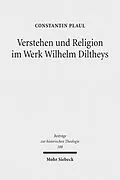Constantin Plaul devotes himself to the development of Wilhelm Dilthey's concept of understanding, focusing initially on his philological context of discovery. In addition, the author examines the systematic dimension in the whole of Dilthey's work.
In modernity, explaining, interpreting, construing, and understanding are no longer just crucial moments in a hermeneutics of written texts. In the course of the eighteenth and nineteenth centuries, a profound transformation took place in which hermeneutical reflections became the basis for all the humanities, cultural studies and social sciences in respect of both methodological as well as fundamental-theoretical terms. Wilhelm Dilthey played a key role in this process. Constantin Plaul devotes himself to the development of the philosopher's concept of understanding, focusing initially on his philological context of discovery. In addition, the author examines the systematic dimension in the whole of Dilthey's work. The line converges ultimately in the consequences for the problem of religion, apprehended by Dilthey not only as an object, but also as an instance of understanding.
Autorentext
Geboren 1981; 2002-09 Studium der Ev. Theologie und Philosophie in Göttingen, Kyoto (Japan), Halle/Saale; 2017 Promotion; 2018 zweites theologisches Examen; 2023 Habilitation; Wissenschaftlicher Mitarbeiter am Lehrstuhl für Systematische Theologie/Ethik der Theol. Fakultät der Martin-Luther-Universität Halle-Wittenberg; Professor für Systematische Theologie und theologische Gegenwartsfragen an der Universität Regensburg.
In modernity, explaining, interpreting, construing, and understanding are no longer just crucial moments in a hermeneutics of written texts. In the course of the eighteenth and nineteenth centuries, a profound transformation took place in which hermeneutical reflections became the basis for all the humanities, cultural studies and social sciences in respect of both methodological as well as fundamental-theoretical terms. Wilhelm Dilthey played a key role in this process. Constantin Plaul devotes himself to the development of the philosopher's concept of understanding, focusing initially on his philological context of discovery. In addition, the author examines the systematic dimension in the whole of Dilthey's work. The line converges ultimately in the consequences for the problem of religion, apprehended by Dilthey not only as an object, but also as an instance of understanding.
Autorentext
Geboren 1981; 2002-09 Studium der Ev. Theologie und Philosophie in Göttingen, Kyoto (Japan), Halle/Saale; 2017 Promotion; 2018 zweites theologisches Examen; 2023 Habilitation; Wissenschaftlicher Mitarbeiter am Lehrstuhl für Systematische Theologie/Ethik der Theol. Fakultät der Martin-Luther-Universität Halle-Wittenberg; Professor für Systematische Theologie und theologische Gegenwartsfragen an der Universität Regensburg.
Titel
Verstehen und Religion im Werk Wilhelm Diltheys
Untertitel
Theologische Dimensionen auf kulturphilosophischer Grundlage
Autor
EAN
9783161563157
Format
E-Book (pdf)
Hersteller
Genre
Veröffentlichung
01.05.2019
Digitaler Kopierschutz
Adobe-DRM
Lesemotiv
Unerwartete Verzögerung
Ups, ein Fehler ist aufgetreten. Bitte versuchen Sie es später noch einmal.
